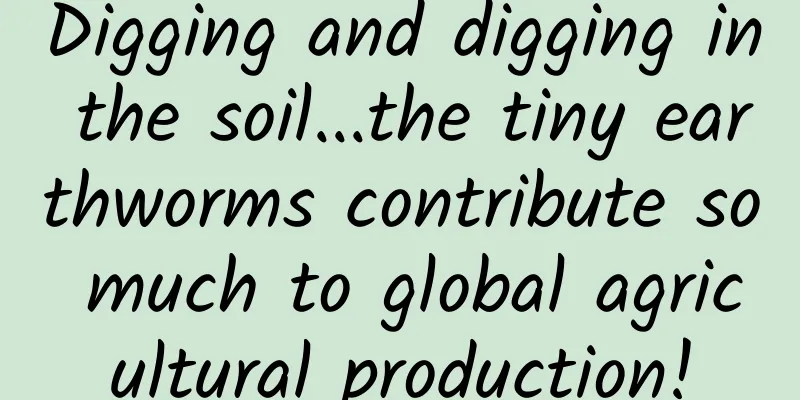Digging and digging in the soil...the tiny earthworms contribute so much to global agricultural production!

|
Science Times reporter Wu Tong A paper published in Nature Communications, a professional academic journal under Springer Nature, shows that earthworms may contribute more than 140 million tons of global food production each year, including 6.5% of grain production and 2.3% of bean production. The authors of the paper believe that establishing an agricultural ecological system for earthworm populations and overall soil diversity is very important for achieving sustainable agricultural goals. Earthworms are one of the common groups of soil animals. They are both "consumers" and "creators" in the ecosystem. Earthworms contribute to the material cycle and energy transfer of soil processes through activities such as feeding, digestion, excretion, secretion and burrowing. They can have an important impact on multiple processes that determine soil fertility and are called "ecosystem engineers." All their activities in the soil are "transformations" of the soil environment. Earthworms are the guardians of healthy soil, supporting plant growth and influencing soil structure, water acquisition, and organic matter circulation. Studies have shown that earthworms can promote plant production of growth hormones and help plants resist common soil pathogens. At present, the contribution of earthworms to global agricultural production has not been quantified, and research on this has been limited in the past. To assess the impact of earthworms on the production of important crops worldwide, the authors and colleagues compared earthworm abundance, soil properties and crop production with previous agricultural data and found that earthworms contribute about 6.5% of grain production, including corn, rice, wheat and barley, and 2.3% of legume production, including soybeans, peas, chickpeas, lentils and alfalfa. The contribution of earthworms to agriculture is particularly high in the Southern Hemisphere, contributing 10% to grain production in sub-Saharan Africa and 8% to Latin America and the Caribbean. The authors believe that earthworms are an important driver of global food production. These findings are among the first attempts to quantify the contribution of beneficial soil organisms to global agricultural production. The authors argue that ecological agro-management practices are needed to enhance the entire soil biota, including earthworms, to strengthen ecosystems for long-term sustainability and agricultural resilience. |
<<: Mianyang, Sichuan, don’t be so low-key!
>>: Is lotus root starch a healthy food? How did lotus root starch become a bowl of paste?
Recommend
How to use Xcode's Targets to manage development and production builds
[[164788]] This post was contributed by Eugene Tr...
Why are subway seats so slippery? On purpose!
Auditing expert: He Yuanda, Deputy General Manage...
Zhihu traffic growth rules!
In the past November, Zhihu released its Q3 2021 ...
The most cost-saving tool and magic weapon in community operations! Talk about the wonderful uses of peripheral products!
In community operations , there is a tool that ca...
August 2024 "Science" Rumors List: Children's medication, half the adult dose? Can choosing good sports equipment improve physical test scores?
1. Can “back sunning” cure all diseases only if d...
I'm EMO! I feel sad when autumn comes. Does "autumn sadness syndrome" really exist?
Review expert: Peng Guoqiu, deputy chief physicia...
Analysis of the Douyin app operation and promotion plan!
Short videos have become the hottest track in rec...
2021 Essential Talking Skills for Live Broadcasters, 33 lessons covering essential talk skills for all aspects of live broadcasting
2021 Practical Course on Essential Scripts for An...
Aren’t non-woven bags used for takeout considered eco-friendly bags? They are also “plastic bags”?
Now, if you buy vegetables online, you can get a ...
How to redeem Alipay points? What are the specific uses of Alipay points?
After completing the real-name authentication on ...
No matter how high-end the frankincense is, it doesn’t taste like milk.
At the beginning of the narrative, let us first c...
How to conduct a fission activity correctly?
This article analyzes the disadvantages of blindl...
The latest news on Beijing’s unblocking time in 2022: Has it been unblocked? Attached is the latest unblocking list!
The local epidemic that occurred in Beijing at th...
How to achieve fission growth? 6 tips!
The current environment tests entrepreneurial tea...
The entire process of account building and optimization, a must-read for investment!
The construction of an account is like a pyramid,...









